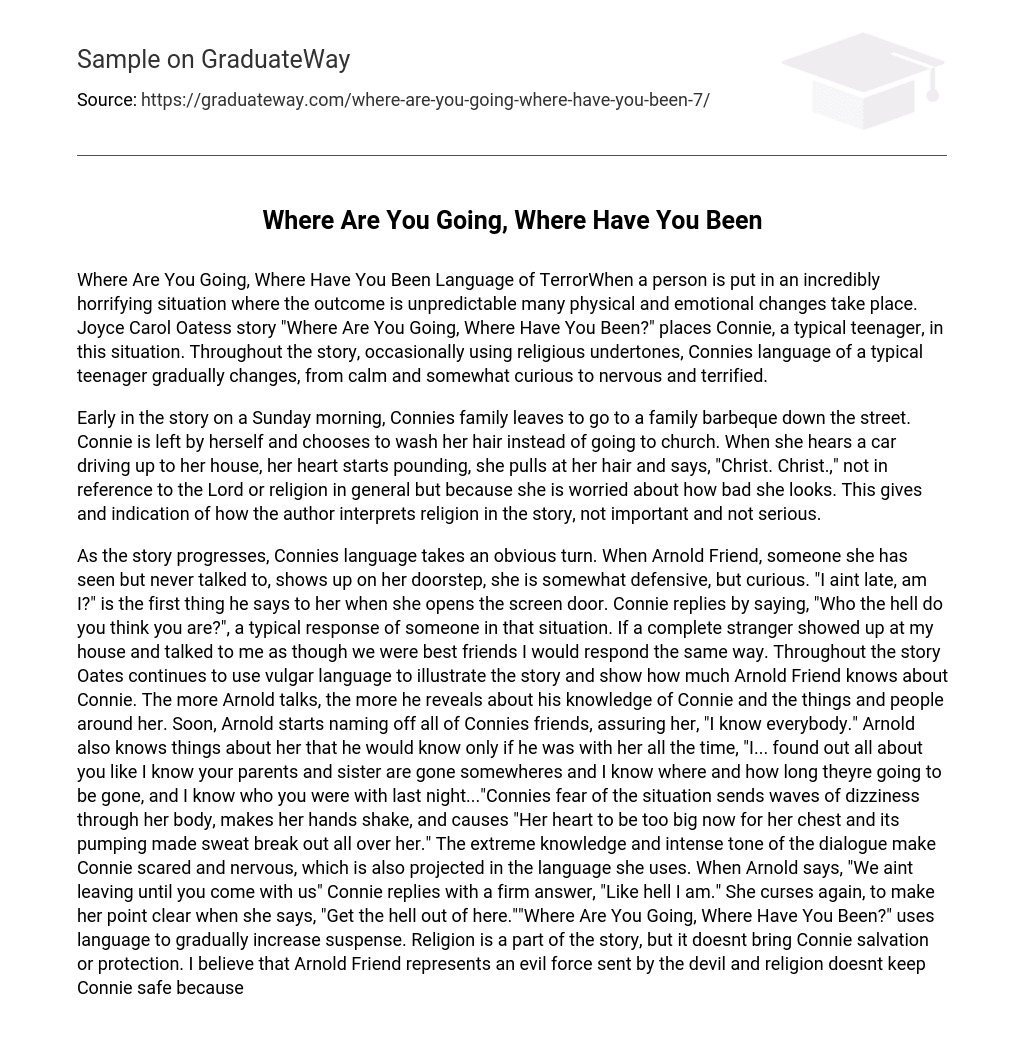Where Are You Going, Where Have You Been Language of TerrorWhen a person is put in an incredibly horrifying situation where the outcome is unpredictable many physical and emotional changes take place. Joyce Carol Oatess story “Where Are You Going, Where Have You Been?” places Connie, a typical teenager, in this situation. Throughout the story, occasionally using religious undertones, Connies language of a typical teenager gradually changes, from calm and somewhat curious to nervous and terrified.
Early in the story on a Sunday morning, Connies family leaves to go to a family barbeque down the street. Connie is left by herself and chooses to wash her hair instead of going to church. When she hears a car driving up to her house, her heart starts pounding, she pulls at her hair and says, “Christ. Christ.,” not in reference to the Lord or religion in general but because she is worried about how bad she looks. This gives and indication of how the author interprets religion in the story, not important and not serious.
As the story progresses, Connies language takes an obvious turn. When Arnold Friend, someone she has seen but never talked to, shows up on her doorstep, she is somewhat defensive, but curious. “I aint late, am I?” is the first thing he says to her when she opens the screen door. Connie replies by saying, “Who the hell do you think you are?”, a typical response of someone in that situation. If a complete stranger showed up at my house and talked to me as though we were best friends I would respond the same way. Throughout the story Oates continues to use vulgar language to illustrate the story and show how much Arnold Friend knows about Connie. The more Arnold talks, the more he reveals about his knowledge of Connie and the things and people around her. Soon, Arnold starts naming off all of Connies friends, assuring her, “I know everybody.” Arnold also knows things about her that he would know only if he was with her all the time, “I… found out all about you like I know your parents and sister are gone somewheres and I know where and how long theyre going to be gone, and I know who you were with last night…”Connies fear of the situation sends waves of dizziness through her body, makes her hands shake, and causes “Her heart to be too big now for her chest and its pumping made sweat break out all over her.” The extreme knowledge and intense tone of the dialogue make Connie scared and nervous, which is also projected in the language she uses. When Arnold says, “We aint leaving until you come with us” Connie replies with a firm answer, “Like hell I am.” She curses again, to make her point clear when she says, “Get the hell out of here.””Where Are You Going, Where Have You Been?” uses language to gradually increase suspense. Religion is a part of the story, but it doesnt bring Connie salvation or protection. I believe that Arnold Friend represents an evil force sent by the devil and religion doesnt keep Connie safe because it appears that she doesnt believe in it. Toward the end of the story she may have tried to affirm God, as a last ditch effort to save herself, but all in all, I think that the language she used was to make the story realistic, and is typical of a scared fifteen year-old girl.





